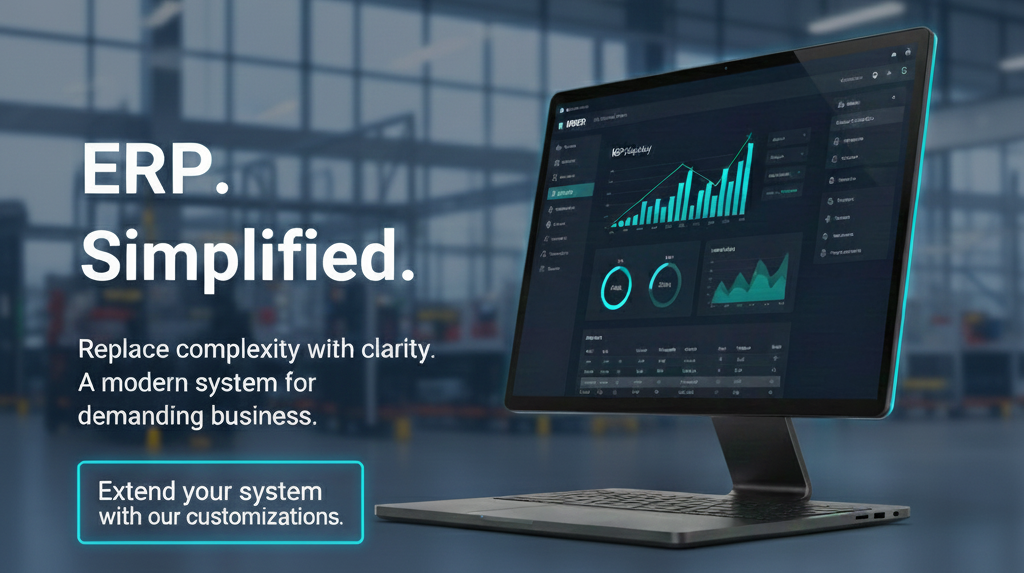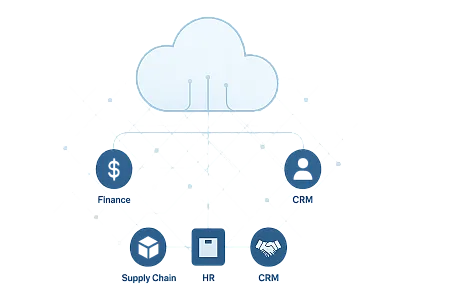1. Introduction to IFS Cloud and Master Data Management
IFS Cloud: Modular, Composable, and API-Driven
IFS Cloud is a next-generation enterprise resource planning (ERP) platform designed to meet the evolving needs of modern organizations. Its architecture is fundamentally modular, allowing organizations to deploy only the components they need—such as finance, supply chain, HR, CRM, and asset management—while maintaining seamless integration across business functions. This modularity is underpinned by a composable system, where digital assets and functionalities can be assembled and reassembled as business requirements change. The platform’s API-driven approach, featuring 100% open APIs, ensures interoperability with third-party systems and supports agile integration strategies. This enables organizations to extend, customize, and scale their ERP landscape efficiently, leveraging RESTful APIs, preconfigured connectors, and support for industry-standard data exchange protocols (EDI, XML, JSON, MQTT, SOAP) .
The Role of Master Data Management (MDM) in IFS Cloud
Master Data Management (MDM) is central to IFS Cloud’s value proposition. MDM ensures that critical business data—such as customer, supplier, product, and asset information—is accurate, consistent, and governed across all modules and integrated systems. By establishing a single source of truth, MDM eliminates data silos, reduces redundancies, and enhances operational efficiency. This is particularly vital in complex ERP environments, where data is often scattered across multiple applications and departments. MDM in IFS Cloud supports regulatory compliance, improves decision-making, and streamlines operations, making it a foundational element for any data-driven enterprise .
2. Understanding Data Contracts in Modern Data Governance
What Are Data Contracts?
Data contracts are formal agreements between data producers (e.g., application teams, business domains) and data consumers (e.g., analytics, reporting, or downstream systems). These contracts specify the structure, semantics, quality, and service-level expectations for data exchanged between parties. They define schemas, metadata, ownership, access rights, and quality metrics, ensuring that both producers and consumers have a shared understanding of the data .
Purpose and Benefits of Data Contracts
- Formalization of Data Exchange: Data contracts clarify what data is provided, in what format, and under what conditions, reducing ambiguity and miscommunication .
- Data Quality and Reliability: By specifying quality standards (e.g., accuracy, completeness, timeliness), contracts ensure that data consumers receive trustworthy data, which is critical for analytics and operational processes .
- Accountability and Governance: Contracts assign clear ownership and stewardship, making it easier to trace issues and enforce data governance policies .
- Compliance and Security: By defining access rights and usage policies, data contracts help organizations comply with regulatory requirements and protect sensitive information .
- Scalability and Efficiency: Standardized contracts reduce integration costs and support the scaling of data products across distributed teams and systems .
3. Relationship Between Master Data Management and Data Contracts
MDM as the Foundation for Data Contracts
MDM provides the authoritative, standardized data that forms the basis for effective data contracts. By ensuring a single source of truth, MDM eliminates inconsistencies and enables organizations to define contracts on top of reliable, governed data assets .
Layering Data Contracts on MDM
- Enforcing Data Quality and Security: Data contracts can be layered atop MDM to specify and enforce data quality metrics, validation rules, and security requirements for data shared between ERP modules or with external partners.
- Interoperability: Contracts define the interfaces and data formats for exchanging master data, ensuring seamless integration across heterogeneous systems and supporting interoperability in complex ERP landscapes.
- Governance and Compliance: The combination of MDM and data contracts strengthens data governance by providing both the data foundation and the operational agreements needed to manage data as a strategic asset .
4. Data Domains in IFS Cloud: Structure and Examples
Concept and Structure of Data Domains
In IFS Cloud, data domains are logical groupings of data assets aligned with key business functions. The platform’s architecture is organized into tiers—presentation, API, business logic, storage, and platform—each supporting the definition and management of data domains. Components within IFS Cloud group related entities, projections, and business logic into coherent capability areas (e.g., General Ledger, Accounts Payable), enabling modular deployment and management .
Table: Example Data Domains in IFS Cloud
| Data Domain |
Business Function |
Example Data Assets |
| Customer |
CRM, Sales, Service |
Customer profiles, contacts, contracts |
| Supplier |
Procurement, Finance |
Supplier records, agreements, payment terms |
| Product |
Manufacturing, Inventory |
Product master, BOM, specifications |
| Asset |
Maintenance, Operations |
Asset registry, maintenance history, warranties |
The IFS Data Catalog: Classification and Governance
The IFS Data Catalog is a key tool for classifying, indexing, and governing data assets within these domains. It automatically scans data sources, creates metadata catalog entries, and classifies information to support compliance and discoverability. The catalog provides a unified view of the data estate, enabling data stewards to manage data assets effectively and ensure alignment with governance policies .
5. Implementing Data Mesh in ERP Systems Using IFS Cloud Data Domains
Core Principles of Data Mesh
Data Mesh is a paradigm shift in data architecture, emphasizing:
- Domain-Oriented Ownership: Data is owned and managed by the business domains closest to its source and use .
- Data as a Product: Each data set is treated as a product, with clear interfaces, quality standards, and product owners .
- Self-Serve Data Infrastructure: Platform teams provide tools and infrastructure that enable domain teams to build, deploy, and operate their own data products .
- Federated Computational Governance: Governance is distributed but coordinated, ensuring consistency, security, and compliance across domains .
Using IFS Cloud Data Domains as the Foundation
IFS Cloud’s modular, domain-aligned architecture is ideally suited for Data Mesh:
- Domain Teams: Assign ownership of data domains (e.g., Customer, Supplier) to business units or cross-functional teams, making them responsible for the quality, lifecycle, and delivery of their data products .
- Data Contracts as Product Interfaces: Use data contracts to define the structure, quality, and access policies for each data product, ensuring reliable and governed data exchange within and across domains .
- Self-Serve Infrastructure: Leverage the IFS Data Catalog and API-driven platform to enable discoverability, access, and integration of data products by other teams or external partners .
- Federated Governance: Implement governance policies that are enforced both centrally (e.g., compliance, security) and locally (e.g., domain-specific quality metrics), using the catalog and contracts as operational tools .
Diagram: Data Mesh with IFS Cloud Data Domains
[Customer Domain]---[Data Contract]---\
[Supplier Domain]---[Data Contract]----> [Data Catalog & Self-Serve Platform] <---[Consumer: Analytics, Reporting, External APIs]
[Product Domain]----[Data Contract]---/
6. Case Studies and Practical Insights
Real-World Examples
- Saxo Bank: Saxo Bank adopted a data mesh architecture to modernize its data infrastructure, leveraging event-driven technologies and secure data mesh solutions. This enabled decentralized data ownership, improved operational efficiency, and enhanced data security .
- Siemens: Siemens has modernized its data infrastructure and analytics capabilities, moving towards decentralized data management and improved accessibility—key tenets of Data Mesh—by partnering with cloud and analytics providers .
Outcomes
Organizations implementing Data Mesh in ERP or similar environments report:
- Improved Agility: Decentralized ownership allows teams to respond faster to business needs.
- Data Democratization: Self-serve platforms and clear contracts make data more accessible and usable across the organization.
- Enhanced Governance: Federated governance ensures compliance and quality without stifling innovation .
Challenges and Best Practices
Key Challenges
- Data Silos and Shadow IT: Decentralization can lead to new silos if not managed with strong governance .
- Integration Complexity: Migrating and integrating legacy data with cloud ERP systems is complex and error-prone .
- Regulatory Compliance: Ensuring compliance in multi-tenant cloud environments requires robust controls .
- Cultural Resistance: Shifting to domain ownership and new governance models can face organizational pushback .
Best Practices
- Develop a Scalable Governance Plan: Establish clear policies, procedures, and tools for data quality, security, and compliance .
- Standardize Data Language: Use metadata and data catalogs to create a common understanding of data assets .
- Embed Governance in Daily Operations: Integrate governance into workflows, not as an afterthought .
- Continuous Monitoring and Improvement: Use KPIs and regular reviews to ensure ongoing data quality and compliance .
- Invest in Training and Change Management: Educate teams on new roles, responsibilities, and the value of data governance .
7. Conclusion
Implementing IFS Cloud Master Data as Data Contracts within a Data Mesh framework represents a powerful approach to modernizing data management in ERP systems. By leveraging IFS Cloud’s modular, API-driven architecture and robust MDM capabilities, organizations can establish reliable, governed data domains that serve as the foundation for domain-oriented data ownership and productization. Data contracts formalize the expectations and responsibilities around data exchange, enhancing data quality, reliability, and compliance.
When combined with Data Mesh principles—domain ownership, data as a product, self-serve infrastructure, and federated governance—this approach delivers tangible benefits: improved business agility, democratized data access, and robust governance. Real-world examples from organizations like Saxo Bank and Siemens demonstrate the transformative potential of this strategy.
As ERP environments grow in complexity and scale, adopting these modern data management practices is essential for organizations seeking to unlock the full value of their data, drive innovation, and maintain a competitive edge in the digital era.
For data architects, ERP professionals, and business leaders, the path forward is clear: embrace modular, governed, and product-oriented data management with IFS Cloud and Data Mesh to future-proof your enterprise data landscape.











